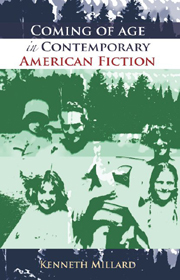Book contents
- Frontmatter
- Contents
- Acknowledgements
- Introduction: Contemporary Coming of Age – Subject to Change
- 1 In the Name of the Father
- 2 I Change Therefore I Am: Growing up in the Sixties
- 3 Citation and Resuscitation
- 4 Language Acquisition: Life Sentences
- 5 Lexicon of Love
- 6 Memoirs and Memorials
- Conclusion
- Bibliography
- Index
4 - Language Acquisition: Life Sentences
Published online by Cambridge University Press: 12 September 2012
- Frontmatter
- Contents
- Acknowledgements
- Introduction: Contemporary Coming of Age – Subject to Change
- 1 In the Name of the Father
- 2 I Change Therefore I Am: Growing up in the Sixties
- 3 Citation and Resuscitation
- 4 Language Acquisition: Life Sentences
- 5 Lexicon of Love
- 6 Memoirs and Memorials
- Conclusion
- Bibliography
- Index
Summary
The coming-of-age novel is a reasonably well-established genre with certain conventions and characteristic habits that have been in evidence at least since Twain's Huckleberry Finn. Some contemporary novels are aware of this heritage and constitute themselves in part by negotiating a relationship with existing forms of narrative language that are perceived as having the power to shape their own story at a fundamental level. These are novels that ask: how can I create an individual voice that does sufficient justice to my story but in forms of language which are already written and which I can only appropriate? These are novels that acknowledge that the story of the self can only be conducted in a language which is to some extent prescribed. An awareness of this issue, and a willingness to confront it directly, makes this chapter's two novels particularly compelling and innovative. These novels manage to conduct an analytical commentary on the form of the narrative while telling their respective stories, and this makes them both particularly subtle and sophisticated interpretations of the genre. Further, these novels are also characterised by a form of journey narrative that has gone wrong. Conventional ideas about the journey of self-discovery are refuted by baulked narratives of loss, failure, and defeat. This feature in turn becomes central to each novel's particular form of social criticism. Coming of age here is simply not possible, or at least traditional ideas of personal fulfilment and social integration in this genre are refuted by the very conditions of the different American societies that they represent.
- Type
- Chapter
- Information
- Coming of Age in Contemporary American Fiction , pp. 98 - 129Publisher: Edinburgh University PressPrint publication year: 2007



